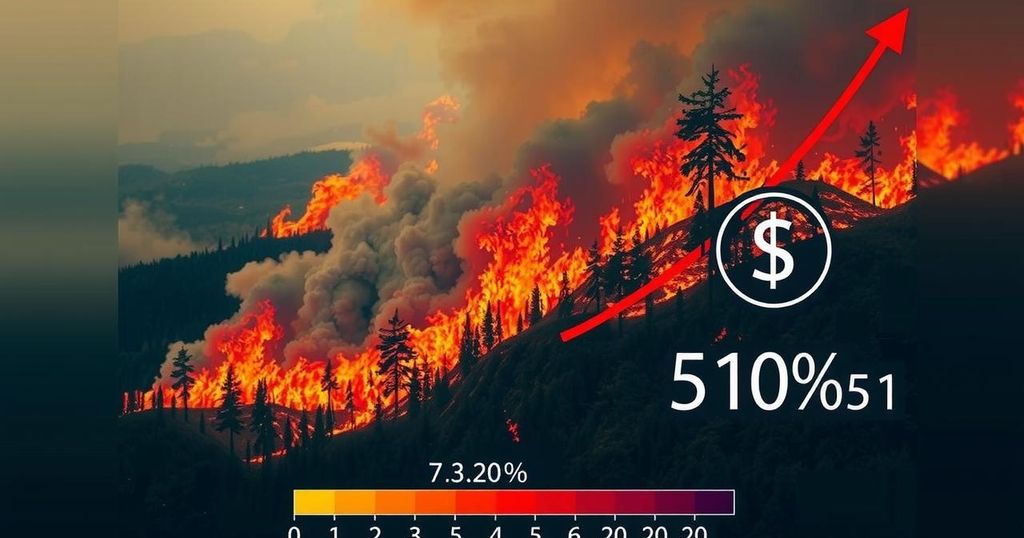Research Establishes Link Between Climate Change and Rising Wildfire Incidents Globally

Researchers have confirmed a strong link between climate change and the rising incidence of wildfires globally, revealing an alarming increase in wildfire smoke-related deaths from fewer than 669 annually in the 1960s to over 12,566 in the 2010s. Studies show that while human interventions can reduce fire spread under certain conditions, they are not enough to combat the growing influence of climate change, which has markedly increased the burned area and mortality rates associated with wildfires in recent decades.
Recent research has established a direct correlation between climate change and the escalating frequency and severity of wildfires on a global scale, in addition to linking these occurrences to significantly increased smoke-related mortality rates in recent decades. In two comprehensive studies conducted by teams from Dalhousie University in Canada, Belgium, the United Kingdom, and Japan, the impact of wildfires on both ecological systems and human health has been scrutinized. The findings indicate a stark rise in wildfire smoke-related fatalities, from under 669 deaths annually in the 1960s to approximately 12,566 deaths per year by the 2010s. One pivotal study, detailed in the journal Nature Climate Change, compared wildfire models that accounted for climate change against those that did not. Results revealed a notable increase in both the number and intensity of wildfires, particularly in sensitive regions such as African savannas, Australia, and Siberia. However, the investigation uncovered considerable regional disparities. In Africa, for example, approximately 70 percent of the global burned area experienced a significant reduction in wildfires, largely attributed to increased human activities and land fragmentation, which inhibit fire spread. In contrast, areas with extensive forests, such as California and Siberia, are witnessing a surge in wildfire incidents, primarily driven by prolonged drought periods and elevated temperatures linked to climate change. Dr. Sian Kou-Giesbrecht from Dalhousie University emphasized the importance of these findings, stating that “the study is important because it shows and quantifies the influence of climate change on increasing wildfires worldwide.” The researchers utilized sophisticated models that factored in climate, vegetation, and population dynamics. Their analysis revealed that, while human interventions like fire management can mitigate wildfire spread during low activity periods, the severity of climate change effects tends to dominate during years of elevated fire occurrences. Seppe Lampe, a leading researcher from Vrije Universiteit Brussel, remarked, “What is striking is that in periods with low to moderate numbers of fires, direct human interventions have a large effect. However, in periods with many fires, the effect of climate change dominates, meaning that in these cases we lose control.” Further simulations indicated that climate change has contributed to an almost 16 percent increase in the global burned area from 2003 to 2019, along with a 22 percent rise in the likelihood of months with above-average burned areas. The paper advocates for immediate and sustained reductions in greenhouse gas emissions alongside effective fire management strategies to alleviate the adverse effects of wildfires on ecosystems and human health. Another significant study, also published in Nature Climate Change, revealed that climate change may have increased the mortality rate associated with wildfire smoke tenfold over five decades. Researchers employed advanced fire-vegetation models in conjunction with health risk assessments to ascertain the contribution of climate change to human mortality due to wildfire-related pollutants. They determined that in the 1960s, climate change was responsible for one to three percent of fire-related deaths, escalating to as high as 28 percent by the 2010s in certain modeling scenarios, with regions in South America, Australia, Europe, and boreal forests in Asia experiencing the highest mortality rates. Dr. Kou-Giesbrecht noted the challenges in linking wildfires definitively to climate change due to various influencing factors but expressed confidence in their robust attribution methodology. She cautioned that unless the current trend of climate change is reversed, the extent of burnt land and the associated health risks could escalate significantly in future decades.
The relationship between climate change and wildfires has become a critical area of research due to the increasing devastation caused by these events globally. Historically, wildfires have been a natural occurrence, but human activities, land management, and shifting climatic conditions have significantly influenced their frequency and severity. Understanding these dynamics is vital for developing effective strategies to mitigate the impacts on human health, ecosystems, and biodiversity. The latest studies reveal alarming trends in wildfire-related deaths and emphasize the urgent need for intervention through emission reductions and comprehensive management strategies.
The studies conducted by researchers from several countries demonstrate a clear connection between climate change and the rise in frequency and intensity of wildfires, resulting in a substantial increase in smoke-related fatalities over past decades. While human interventions can mitigate some impacts of wildfires, they are insufficient to counteract the overwhelming influence of climate change, especially during periods of extreme weather. The findings highlight the necessity for immediate, systemic changes to greenhouse gas emissions and fire management practices to curb the detrimental effects of wildfires on public health and the environment.
Original Source: www.dal.ca






